

Words to use in search box: creation, evolution, flood, nasa etc...
Literal 6 day creation


Atheists think they are scientists just because they have a controlling interest and use science to push their worldviews.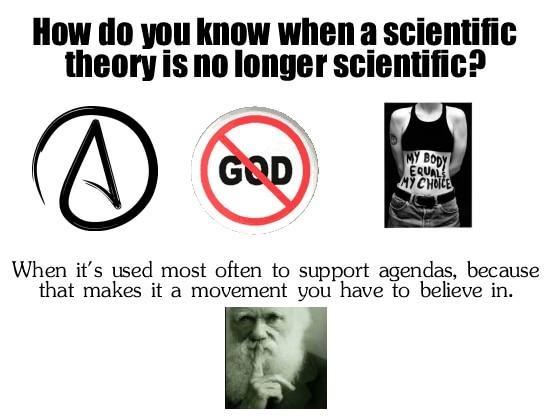
Science is not about worldviews. So when you mix science with agenda and worldviews it’s no longer science. Below is what it looks like when you add these things to science, as an atheist preaches evolution as gospel from behind the pupil at an atheist church.
The main reason atheists get mad during a debate about evolution is because of their frustrations when we make a point they cannot refute, and it makes them face the reality that what they believe is really a lie. Proof? Out of all the claims made about evolution from a single cell to all that we see, less then 1% is actually observable. And the reason for this is time constraints. To observe the 99%, one would have to have a time machine.
The *claimed* Tree of Life is nothing more than an interpretation of the evidence. There is *zero* observation because of time constraints. That makes the drawing more of an opinion than fact. And because on evolutionists are allowed to:
1) Dig up the evidence.
2) Interpret the evidence.
3) Peer review the evidence.
4) Make any conclusion concerning the evidence.
It makes the evidence not only unobserved due to time constraints, but extremely bias considering that those who already believe that it’s a true proven fact are the only ones allowed to do any work concerning the theory
And the proof that this goes well beyond science, is that atheists use it to support their worldviews and agendas, which makes the theory personal, which ensures there will *always be bias* concerning it. The only way one can approach either idea (creation or evolution) from a non-biased stand point is to:
1) Remove the theist from creation.
2) Remove the atheist from evolution.
In this way the evidence for both ideas stand on it’s own, and can be tested on it’s merits alone which 100% supports what the scientific method is all about. The question is: Who would be willing to do this, and would both sides accept the conclusions?
As one atheist said, that I brought this up to: You ask the impossible. No one can become that neutral to the subject, no one… Was he saying this because it’s true, or because he’s unwilling to give up his biases because he knows the outcome would not be in his favor?
Now do I say that because I am bias towards what I believe? Nope. After 25 years of debating atheists on the subject of C vs. E, one thing I have found is that if you are truly searching for truth. You have to consider everything. And be willing to step back from you belief and say: Prove what you claim, and I’ll convert right here right now. And I have done this on several occasions much to the surprise of my debate opponents who then say: Even if I did prove it you’d still reject it.
To which I respond: Then prove it and let’s see. Go get as many people as you need to do this and return and let’s see who’s really bias. And they never do. They either leave, call me names etc…. But the challenge is never ever met. That is because the challenge is a put up or shut up type challenge. And because people are not really looking for truth from either side to any degree, because they have made their belief personal. They cannot accept being wrong.
The perfect example is this episode of friends where Ross and Pheobe have an argument over the subject of evolution. And Ross cannot accept that Pheobe has a different opinion and that he might be wrong.
Argument #1:
Premise #1. Every existing entity that shows evidence of design requires a designer superior to itself
Premise #2. God shows evidence of design in himself
Conclusion #1. Hence God requires a designer (another God) superior to himself
Response: Being “eternal” means has always existed. If God needs to be created He is not eternal. If eternal things require a first cause to exist then they are not eternal in every sense of the word and it’s meaning.

Physical things require a first cause, such as evolution. But even evolution has no first cause to start the causation process. If it does then several questions need to be addressed.
1) What is the first cause?
2) Who observed it?
3) And can this claim be repeated in a lab to prove it?
Why is this important? Evolution is called a “Scientific Theory”. right? Which means one of the criteria’s to become such a high level theory should be a provable “First Cause”. Because in the causation process, the First Cause starts the causation process for all the other causes to work and become viable possibilities. Without that First Cause no process claimed have a viable possibility.
Argument #2:
Premise #3. Infinite regressions are not possible
Conclusion #1 implies an infinite regression (an infinite number of gods)
Conclusion #2. Hence, Conclusion #1 is not possible, so no god can exist.
Response: Infinite regression cannot be disproved or proved because it cannot be tested, right? So this claim either way would be more of an opinion then fact without proof, right? Now logic and reason would say and I agree that no, this cannot happen. But you are putting upon an infinite God finite restrictions. Apply the rules that we live under as finite beings to a infinite God who lives in a infinite time dimension.
So the question is a fallacy because you forgot that it does not apply to a eternal infinite Heaven where there is no death or aging.
This is also why, in your 100% physical belief of we just evolved, we die and that’s it. That you must also believe that something comes from nothing. You know infinite regression does not work in the physical universe where the laws of thermal dynamics would exist. But God solves this problem by living in a realm where these things do not exist. So how would the infinite regression problem apply to an eternal – infinite God?
So where you claim a problem exists, becomes an answer that fits better than the one you give for what you believe.
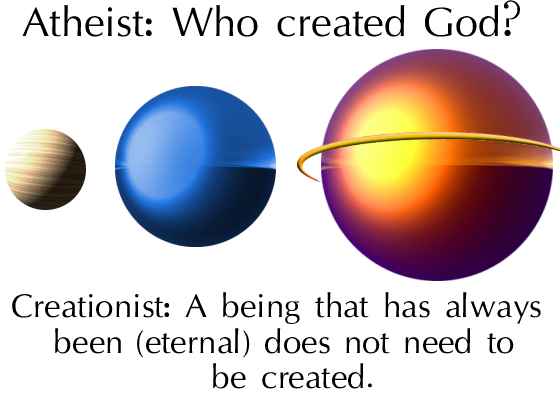
To better understand this I think a little about creation needs to be explained.
Genesis 1:1 In the beginning God created the heaven and the earth.
3 things are needed to create a universe. Time, Space, and Matter.
1) In the beginning = Time.
2) God created the heaven = our physical heaven aka space.
3) And the earth = matter.
If time was not always then there was a time where time did not exist. Which means what did exist did not require time in order to exist. Which also, by the way, eliminates infinite regression. Because how can you have infinity of anything where time itself is infinite and already solves the problem just by being so?
Richard is trying to push the idea that being similar is unique and only applies to evolution period. That genes being almost alike is mutually exclusive to the evolution idea and could never apply to Creation or a Creator.
In engineering where intelligent designers create things, build things etc… When things are made that serve one purpose, are they really really that much different even though it maybe an original creation? Examples:
1) Cars. Made and created by intelligent designers, do they really differ that much from the original design even with technologies changing everyday?
2) Bridges. Made and created by intelligent designers, do they really differ that much from the first bridge even with all the technology changes?
3) Houses. Do they really change much from the original first house design?
The problem that Dawkins refuses to see with his answer is that DNA is required baseline for all life. So all life (like the car, bridge and house), are similar because with DNA how far could you really go from the original code that allowed life to exist?
If you think about it, evolving with no direction from intelligence would really produce a non-similar code instead of a related code where all life has code that is related.
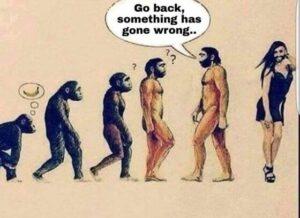
The idea is basically lame and Dawkins is promoting a falsehood of an idea. Intelligent design of physical things prove over and over and over again. That the original was the base, and the base will “always” be part of any upgrades, new technologies, or even redesigns.
Let’s take programming for computer operating systems for example. Whether it’s Windows, Linux, Apple or whatever. Is not all the designs based on the first one aka DOS? And regardless of how they upgrade it, does not all still require some type of BIOS programming to help the hardware communicate with the software?
And where did DOS go? I bet many of you still think that Windows 10 does not have DOS. Well it does it’s just hidden. I repair hardware, software, and build computers. I also design website like the one you are on. So I’m going to bring up a DOS screen in my Windows 10 just to show you the programming never really got rid of it. The pic of the DOS screen is below.
The Dos is the black screen and I put the system information screen in front to show that it’s really Windows 10. I can type commands in the DOS and it will execute them. Did computer coding for operating system evolve naturally, or were they designed?


So saying or claiming similarities = evolution only is about as lame as the picture above is funny. Because randomness has no direction therefore cannot produce similar things. That’s why in biology…
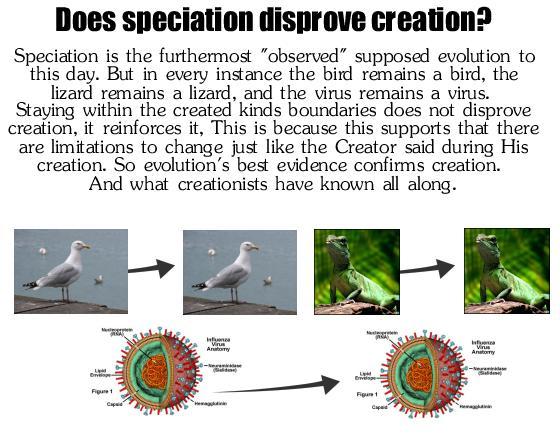
You don’t stray much from the base programming because a designer original design is the template for everything else.
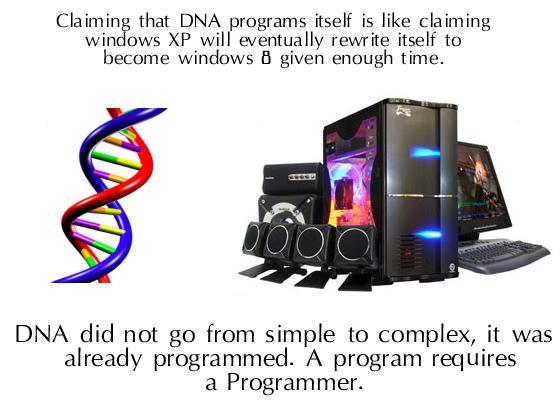
And you don’t get program without a programmer. In programming the programmer often leaves the mark aka signature to show who programmed this program. Who do you think was the first to do that? God was.

So no Dawkins, it’s not that we don’t listen and have our fingers in our ears going la la la, I can’t hear you. It’s you and those like you that do this.
YecHeadquarters
We firmly believe that the internet should be available and accessible to anyone, and are committed to providing a website that is accessible to the widest possible audience, regardless of circumstance and ability.
To fulfill this, we aim to adhere as strictly as possible to the World Wide Web Consortium’s (W3C) Web Content Accessibility Guidelines 2.1 (WCAG 2.1) at the AA level. These guidelines explain how to make web content accessible to people with a wide array of disabilities. Complying with those guidelines helps us ensure that the website is accessible to all people: blind people, people with motor impairments, visual impairment, cognitive disabilities, and more.
This website utilizes various technologies that are meant to make it as accessible as possible at all times. We utilize an accessibility interface that allows persons with specific disabilities to adjust the website’s UI (user interface) and design it to their personal needs.
Additionally, the website utilizes an AI-based application that runs in the background and optimizes its accessibility level constantly. This application remediates the website’s HTML, adapts Its functionality and behavior for screen-readers used by the blind users, and for keyboard functions used by individuals with motor impairments.
If you’ve found a malfunction or have ideas for improvement, we’ll be happy to hear from you. You can reach out to the website’s operators by using the following email ikester7579@yahoo.com
Our website implements the ARIA attributes (Accessible Rich Internet Applications) technique, alongside various different behavioral changes, to ensure blind users visiting with screen-readers are able to read, comprehend, and enjoy the website’s functions. As soon as a user with a screen-reader enters your site, they immediately receive a prompt to enter the Screen-Reader Profile so they can browse and operate your site effectively. Here’s how our website covers some of the most important screen-reader requirements, alongside console screenshots of code examples:
Screen-reader optimization: we run a background process that learns the website’s components from top to bottom, to ensure ongoing compliance even when updating the website. In this process, we provide screen-readers with meaningful data using the ARIA set of attributes. For example, we provide accurate form labels; descriptions for actionable icons (social media icons, search icons, cart icons, etc.); validation guidance for form inputs; element roles such as buttons, menus, modal dialogues (popups), and others. Additionally, the background process scans all the website’s images and provides an accurate and meaningful image-object-recognition-based description as an ALT (alternate text) tag for images that are not described. It will also extract texts that are embedded within the image, using an OCR (optical character recognition) technology. To turn on screen-reader adjustments at any time, users need only to press the Alt+1 keyboard combination. Screen-reader users also get automatic announcements to turn the Screen-reader mode on as soon as they enter the website.
These adjustments are compatible with all popular screen readers, including JAWS and NVDA.
Keyboard navigation optimization: The background process also adjusts the website’s HTML, and adds various behaviors using JavaScript code to make the website operable by the keyboard. This includes the ability to navigate the website using the Tab and Shift+Tab keys, operate dropdowns with the arrow keys, close them with Esc, trigger buttons and links using the Enter key, navigate between radio and checkbox elements using the arrow keys, and fill them in with the Spacebar or Enter key.Additionally, keyboard users will find quick-navigation and content-skip menus, available at any time by clicking Alt+1, or as the first elements of the site while navigating with the keyboard. The background process also handles triggered popups by moving the keyboard focus towards them as soon as they appear, and not allow the focus drift outside it.
Users can also use shortcuts such as “M” (menus), “H” (headings), “F” (forms), “B” (buttons), and “G” (graphics) to jump to specific elements.
We aim to support the widest array of browsers and assistive technologies as possible, so our users can choose the best fitting tools for them, with as few limitations as possible. Therefore, we have worked very hard to be able to support all major systems that comprise over 95% of the user market share including Google Chrome, Mozilla Firefox, Apple Safari, Opera and Microsoft Edge, JAWS and NVDA (screen readers).
Despite our very best efforts to allow anybody to adjust the website to their needs. There may still be pages or sections that are not fully accessible, are in the process of becoming accessible, or are lacking an adequate technological solution to make them accessible. Still, we are continually improving our accessibility, adding, updating and improving its options and features, and developing and adopting new technologies. All this is meant to reach the optimal level of accessibility, following technological advancements. For any assistance, please reach out to ikester7579@yahoo.com